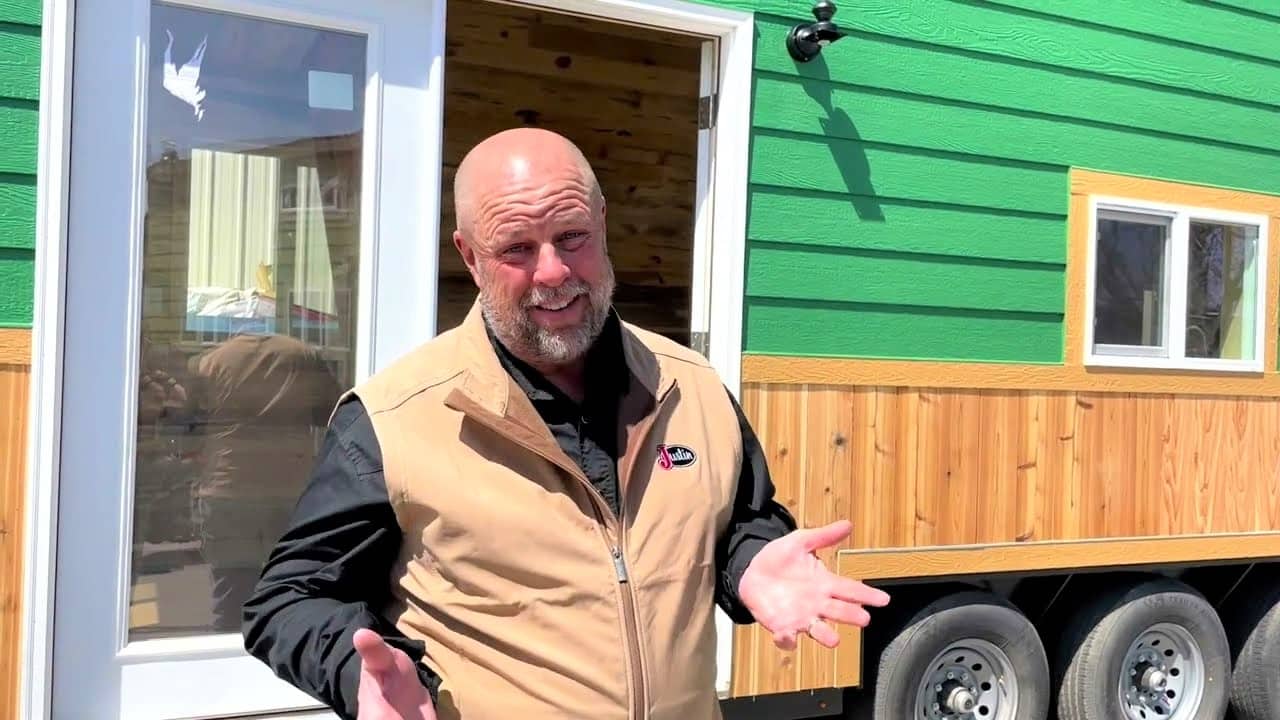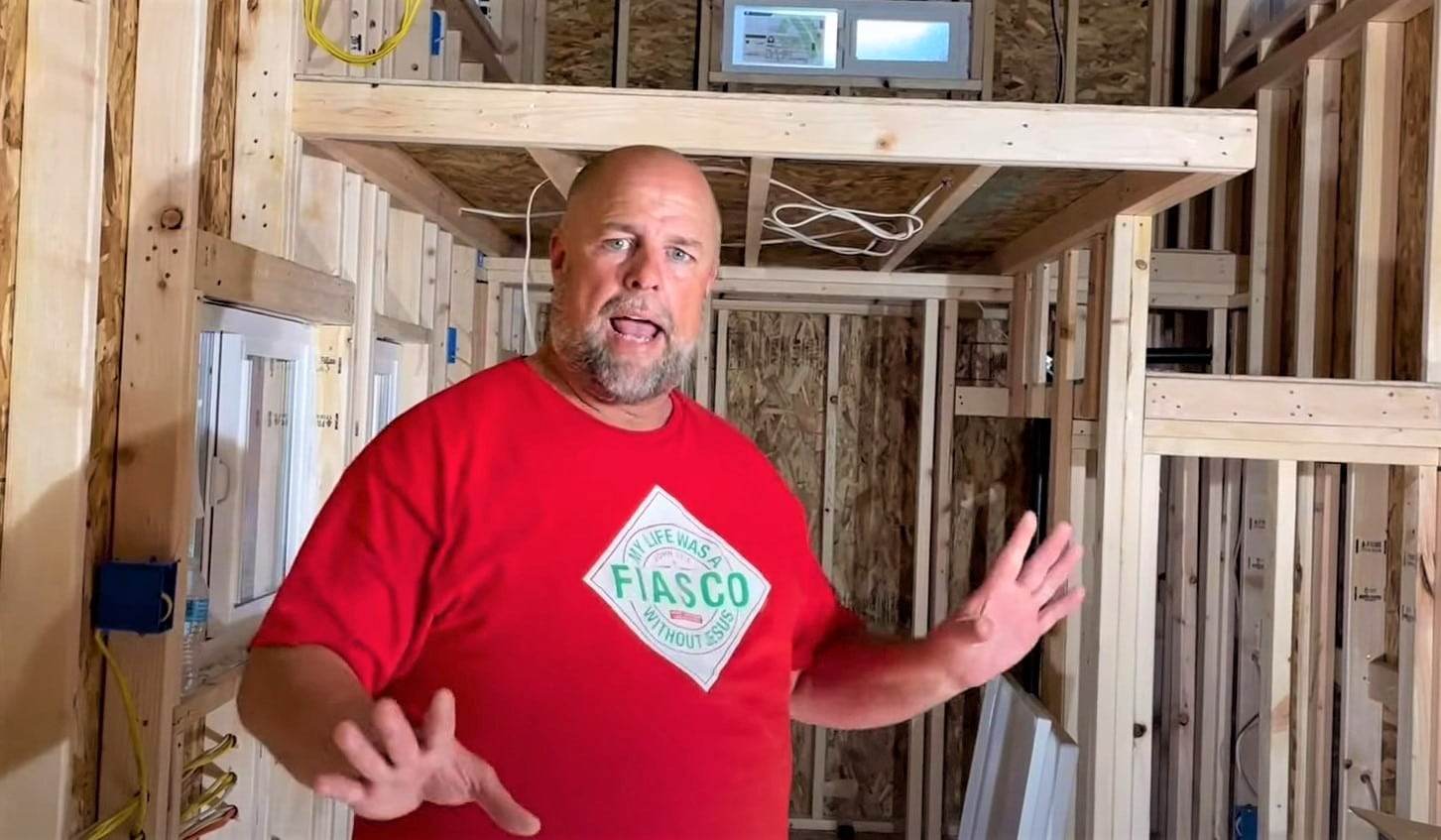
Matt Sowash, founder of Holy Ground Tiny Homes, stands outside a 32-foot home that it built. (Images courtesy of YouTube)
Englewood police are investigating reports that Holy Ground Tiny Homes, a bankrupt builder in that city, has taken customers’ money and provided them nothing in return.
Scot Allen, an investigator and spokesman for the Englewood Police Department, said police reports filed by Holy Ground customers are being investigated by Det. Jessica Moskal.
“Our detective is also working with the (18th Judicial) District Attorney’s Office,” he said.
No charges have been filed in the case. Englewood police records related to the investigation are sealed while that investigation continues, according to Allen.
On Aug. 29, BusinessDen first reported that Holy Ground, a nonprofit founded by convicted fraudster Matthew Sowash in 2019, had taken customers’ life savings, kept them waiting years for homes that were promised to arrive in months, and refused refunds.
Later that week, a northern Colorado woman whose daughter paid for a Holy Ground house but didn’t receive it called the Englewood Police Department to report that Holy Ground was defrauding customers, according to police records obtained by BusinessDen.
An Englewood officer visited Holy Ground’s office — which it was evicted from one month later — but didn’t take any immediate action, according to records. In a parking lot that Holy Ground shared with several other businesses, officers found two people with drugs and arrested them on warrants, according to a district attorney’s office spokesman.
“These are two different things. That was unrelated to a business down there,” Allen said.
Through an attorney, Sowash declined to comment on the Englewood investigation. In 2009, he pleaded guilty to felony theft for bilking investors in a poker league out of nearly $500,000. He was sentenced to five years in prison and served less than two years.
Holy Ground filed for Chapter 11 bankruptcy protection Oct. 7. In a letter to customers Oct. 14, Sowash apologized but said it was “the only way I can make sure the business is safe and that we can live up to our obligation of making sure everyone gets their money back.”
“A lot of you have reached out to us and we really can’t respond to anyone right now. We have to focus on getting the business healthy again,” the CEO wrote then. “We have a long road to haul and we need all the gas in our tank that’s possible.”
That same day, Holy Ground’s bankruptcy attorneys filed a list of its debts and assets, revealing the full extent of the company’s financial problems.
Holy Ground owes 180 customers in 36 states a total of $5.7 million, all of which relates to payments for tiny homes, according to the filing. The company also owes four lenders $765,000.
Holy Ground listed $245,000 in assets, indicating it does not have cash or inventory that comes close to the total payments made by customers still waiting for their promised homes.
“Again, I apologize for all of this,” Sowash wrote to customers Oct. 14, “but we are moving forward and we will get this done.”

Matt Sowash, founder of Holy Ground Tiny Homes, stands outside a 32-foot home that it built. (Images courtesy of YouTube)
Englewood police are investigating reports that Holy Ground Tiny Homes, a bankrupt builder in that city, has taken customers’ money and provided them nothing in return.
Scot Allen, an investigator and spokesman for the Englewood Police Department, said police reports filed by Holy Ground customers are being investigated by Det. Jessica Moskal.
“Our detective is also working with the (18th Judicial) District Attorney’s Office,” he said.
No charges have been filed in the case. Englewood police records related to the investigation are sealed while that investigation continues, according to Allen.
On Aug. 29, BusinessDen first reported that Holy Ground, a nonprofit founded by convicted fraudster Matthew Sowash in 2019, had taken customers’ life savings, kept them waiting years for homes that were promised to arrive in months, and refused refunds.
Later that week, a northern Colorado woman whose daughter paid for a Holy Ground house but didn’t receive it called the Englewood Police Department to report that Holy Ground was defrauding customers, according to police records obtained by BusinessDen.
An Englewood officer visited Holy Ground’s office — which it was evicted from one month later — but didn’t take any immediate action, according to records. In a parking lot that Holy Ground shared with several other businesses, officers found two people with drugs and arrested them on warrants, according to a district attorney’s office spokesman.
“These are two different things. That was unrelated to a business down there,” Allen said.
Through an attorney, Sowash declined to comment on the Englewood investigation. In 2009, he pleaded guilty to felony theft for bilking investors in a poker league out of nearly $500,000. He was sentenced to five years in prison and served less than two years.
Holy Ground filed for Chapter 11 bankruptcy protection Oct. 7. In a letter to customers Oct. 14, Sowash apologized but said it was “the only way I can make sure the business is safe and that we can live up to our obligation of making sure everyone gets their money back.”
“A lot of you have reached out to us and we really can’t respond to anyone right now. We have to focus on getting the business healthy again,” the CEO wrote then. “We have a long road to haul and we need all the gas in our tank that’s possible.”
That same day, Holy Ground’s bankruptcy attorneys filed a list of its debts and assets, revealing the full extent of the company’s financial problems.
Holy Ground owes 180 customers in 36 states a total of $5.7 million, all of which relates to payments for tiny homes, according to the filing. The company also owes four lenders $765,000.
Holy Ground listed $245,000 in assets, indicating it does not have cash or inventory that comes close to the total payments made by customers still waiting for their promised homes.
“Again, I apologize for all of this,” Sowash wrote to customers Oct. 14, “but we are moving forward and we will get this done.”

